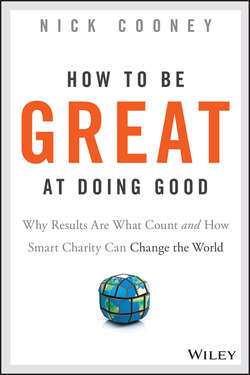How To Be Great At Doing Good

Реклама. ООО «ЛитРес», ИНН: 7719571260.
Оглавление
Cooney Nick. How To Be Great At Doing Good
Praise for How to Be Great at Doing Good
Preface. Schindler's Regret
1. Why Charity?
Asking Why
The Goal of Charity
Barriers to Good
The Challenge of “Why?”
2. Doing Good or Doing Great?
A Tale of Two Charities
Doing Good, or Doing a Lot of Good?
3. Facing the “Brutal Facts” on How Much Good We Are Accomplishing
Gritting Our Teeth and Heading Down the Slope
All Charities Are Not Created Equal
Asking the Genie in the Bottle: Making Comparisons When Comparisons Seem Hard
There Are Always Big Differences Between Charities
Accepting the Fact That We Can Always Do Better
It's Always Subjective, and There's No Way Around That
But Wait…Does That Mean All Theaters Are Doomed?
4. Chasing the Bottom Line
How to Do More Good for Less Money. Defining Our Bottom Line
Doubling Down on Saving Rabbits
Where Following the Bottom Line Leads, and Why It Can Be Hard to Follow
When Following the Bottom Line Means Making Big Changes
Why We Lose Sight of the Bottom Line
5. Why Efficiency Means Everything for Donors (and Charities, Too)
Bringing It Back to the Bunnies
The Space to Be Human
There Are Massive Differences Between Charities in the Same Field
Coming to Grips with the Hard Facts
6. How We Can Drive Our Favorite Charities to Succeed
The $1,500 Bottle of Soda
The Free Market and the World of Charity
Giving Non-Profits the Incentive to Be Great
It's Not All Donors' Fault
Unhelpful Advice
A New Breed of Charity Advisors
7. Our Brains Don't Want Us to Be Great at Doing Good, But We Can Outsmart Them
What Charity Looks Like on the Inside
Questioning Our Motives
Looking Out for Number One, in More Ways Than One
Our Biases Try to Rule Us, and This One Is Really Bad
Empathy and Evolution
More Biases and Other Mental Quirks
Defeating Our Brains and Doing as Much Good as Possible
Putting Our Self-Centeredness to Work
8. The Advice We Are Given About Charity Is Wrong – Here's the Truth
Following Your Passion Is a Bad Idea
Being Great at What You Do Doesn't Matter Unless You're Doing the Right Thing
Not All Charity Work Is Needed or Worth Doing Right Now
We Have to Make Hard Decisions About Who to Help and Who to Ignore
Doing Good Doesn't Always Feel Good
Charity Is All About Winning
9. Moving Forward with Humility
Admitting What We Don't Know
Knowing What We Don't Know
The Wonderful World of Science
Learning How to Do Good Instead of Guessing How to Do Good
10. Nine Steps to Greatness
1. Get Serious
2. Never Forget the Goal of Charity
3. Shun Fuzzy Thinking and Feel-Good Rhetoric – They Are Self-Centered
4. Be Aware of the Psychological Biases We All Have
5. Be Willing to Face the Hard Facts
6. Define and Make Decisions Around a Bottom Line
7. Measure, Measure, Measure
8. Give Non-Profits the Incentive to Be Great
9. And Remember: Never Forget the Goal of Charity
Conclusion
The Joy of Great Charity
About the Author
References
Index
WILEY END USER LICENSE AGREEMENT
Отрывок из книги
In July of 1938, Schindler was arrested by the Czech government and jailed for espionage. Had Germany chosen not to invade that country, the story for Schindler – and many others – may have ended there, in a dismal Czech prison. But just three months later Germany invaded and took control of large portions of the country. Schindler was sprung from his cell, praised for his work, and promptly sent on to Poland to continue his espionage in advance of another planned invasion.
As part of the deal allowing him to keep his factory, Schindler had to agree to transition from an enamelware producer to a munitions producer and supply anti-tank grenades to the German war effort. Of course, this presented a major problem for Schindler. He didn't want to support the German war effort by producing grenade shells. But his hands were tied; had he refused, his factory would have been shuttered and his Jewish workers all shipped off to concentration camps.
.....
None of us wants to look back later in life with Schindler's regret, realizing only too late that, however much good we did, we could have done so much more. None of us wants to look back and realize that we could have helped more individuals but failed to do so.
This is a book about taking a calculated approach to doing good. It is a book about how to get more out of our donations, our volunteering, and the work that some of us put in as non-profit staffers. It is a book about how you and I can get more individuals out of a lifetime of misery.
.....